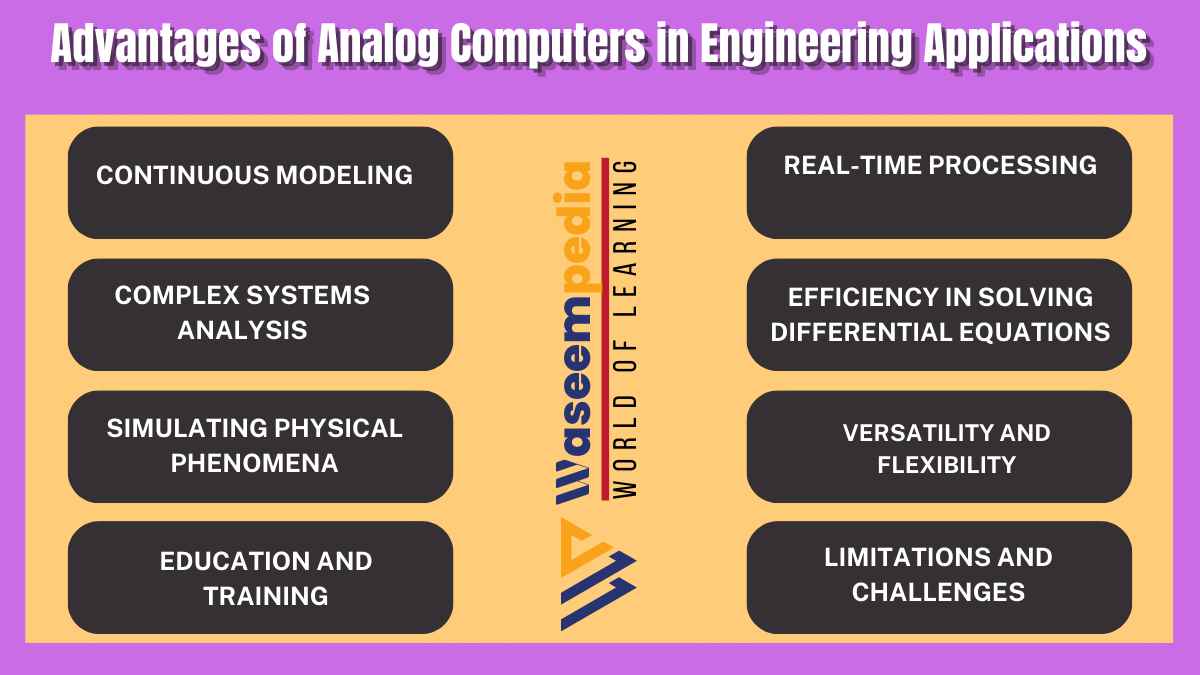Analog computers play a vital role in engineering applications, complementing the strengths of digital computers. Analog computers have many advantages like modeling, real-time processing, complex systems analysis, and efficient solving of differential equations provides engineers with unique capabilities.
The versatility, flexibility, and educational value offered by analog computers further contribute to their significance in the engineering field.
Analog computers have long played a significant role in engineering applications, offering unique advantages that complement the digital counterparts. While digital computers have become pervasive in engineering disciplines, analog computers continue to hold a special place due to their specific strengths and contributions.
In this article, we will explore the advantages of analog computers in engineering applications and how they enhance the field’s capabilities.
Analog computers are computational devices that operate on continuous physical variables to solve complex engineering problems. They offer unique advantages in various engineering applications, enabling engineers to tackle challenges that digital computers may not address optimally. Let’s delve into the advantages that analog computers bring to the field of engineering.
What are Analog Computers?
An analog computer is a type of computer that uses physical quantities, like voltage or rotation, to represent and solve problems. It works by manipulating continuous data, rather than using discrete values like digital computers.
8 Advantages of Analog Computers in Engineering Applications
8 Advantages of Analog Computers in Engineering Applications are as following.
1. Continuous Modeling
One of the significant advantages of analog computers in engineering applications is their ability to perform continuous modeling. Engineering problems often involve systems with continuous variables, such as fluid flow, electrical circuits, and mechanical vibrations.
Analog computers can accurately simulate and model these systems, providing engineers with valuable insights into their behavior.
2. Real-Time Processing
Analog computers excel at real-time processing, making them indispensable in engineering applications that require immediate feedback.
They can quickly process signals and provide instantaneous results, enabling engineers to monitor and control systems in real-time. This capability is particularly valuable in applications such as process control, robotics, and aerospace engineering.
3. Complex Systems Analysis
Analog computers are well-suited for analyzing complex engineering systems. By leveraging their ability to handle multiple variables simultaneously, engineers can study intricate interactions within a system.
This enables the identification of critical parameters, understanding system dynamics, and optimizing system performance.
4. Efficiency in Solving Differential Equations
Engineering problems often involve solving differential equations, which can be computationally demanding. Analog computers are highly efficient in solving such equations, as they naturally operate in continuous time.
By using analog computing techniques, engineers can obtain approximate solutions to differential equations more quickly and with less computational overhead.
5. Simulating Physical Phenomena
Analog computers excel in simulating physical phenomena, allowing engineers to study and analyze real-world behavior. By accurately replicating the physical aspects of a system, analog computers provide a tangible representation that aids in understanding complex phenomena.
This enables engineers to validate designs, predict system behavior, and optimize performance before implementing them in the real world.
6. Versatility and Flexibility
Analog computers offer versatility and flexibility in engineering applications. They can be easily reconfigured by adjusting circuit parameters, making them adaptable to different experiments and scenarios.
This flexibility allows engineers to explore various design alternatives and perform rapid prototyping, enhancing creativity and efficiency in the engineering process.
7. Education and Training
Analog computers have an educational value in engineering. They provide a hands-on experience for students, allowing them to gain a deeper understanding of engineering principles and concepts.
By working with analog computers, students can develop intuition and insight into complex systems, fostering creativity and innovation in their engineering pursuits.
8. Limitations and Challenges
While analog computers offer many advantages, they are not without limitations. They are susceptible to noise, inaccuracies, and component drift, which require careful calibration and maintenance.
Additionally, analog computers may not be as suitable for problems requiring high precision or extensive storage of data.
Related FAQ’s
Are analog computers still used in modern engineering applications?
While digital computers have become dominant in engineering, analog computers are still used in specific applications where their advantages are beneficial, such as continuous modeling, real-time processing, and simulating physical phenomena.
Can analog computers handle complex engineering systems?
Yes, analog computers excel in analyzing complex engineering systems. Their ability to handle multiple variables simultaneously allows engineers to study intricate interactions and optimize system performance.
What are the limitations of analog computers in engineering applications?
Analog computers can be affected by noise, inaccuracies, and component drift. They may also struggle with high precision requirements and extensive data storage. Careful calibration and maintenance are necessary to mitigate these limitations.
How do analog computers enhance engineering education and training?
Analog computers provide a hands-on experience for students, allowing them to develop a deeper understanding of engineering principles. Working with analog computers helps students gain insight into complex systems and encourages creativity in their engineering endeavors.

